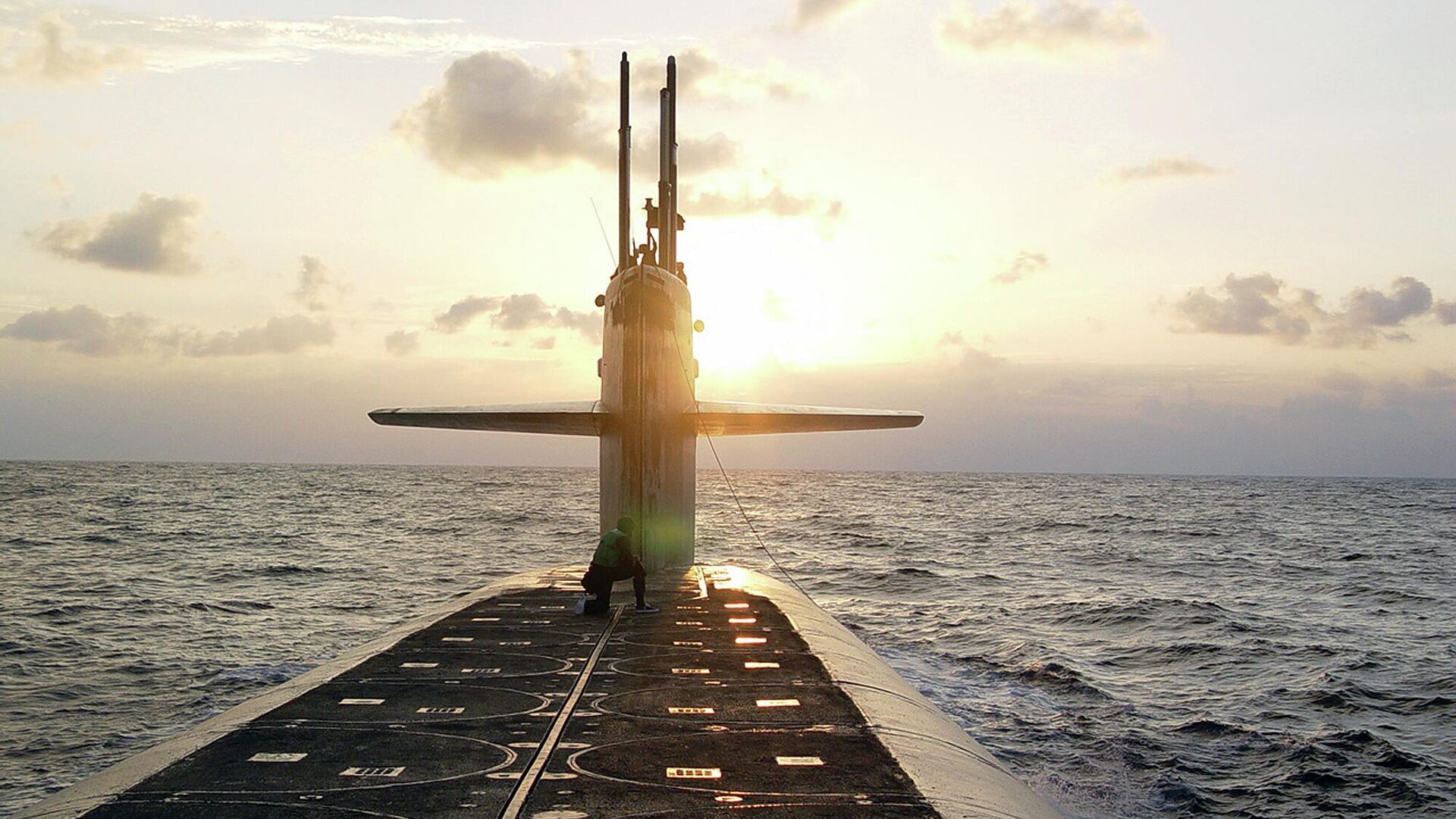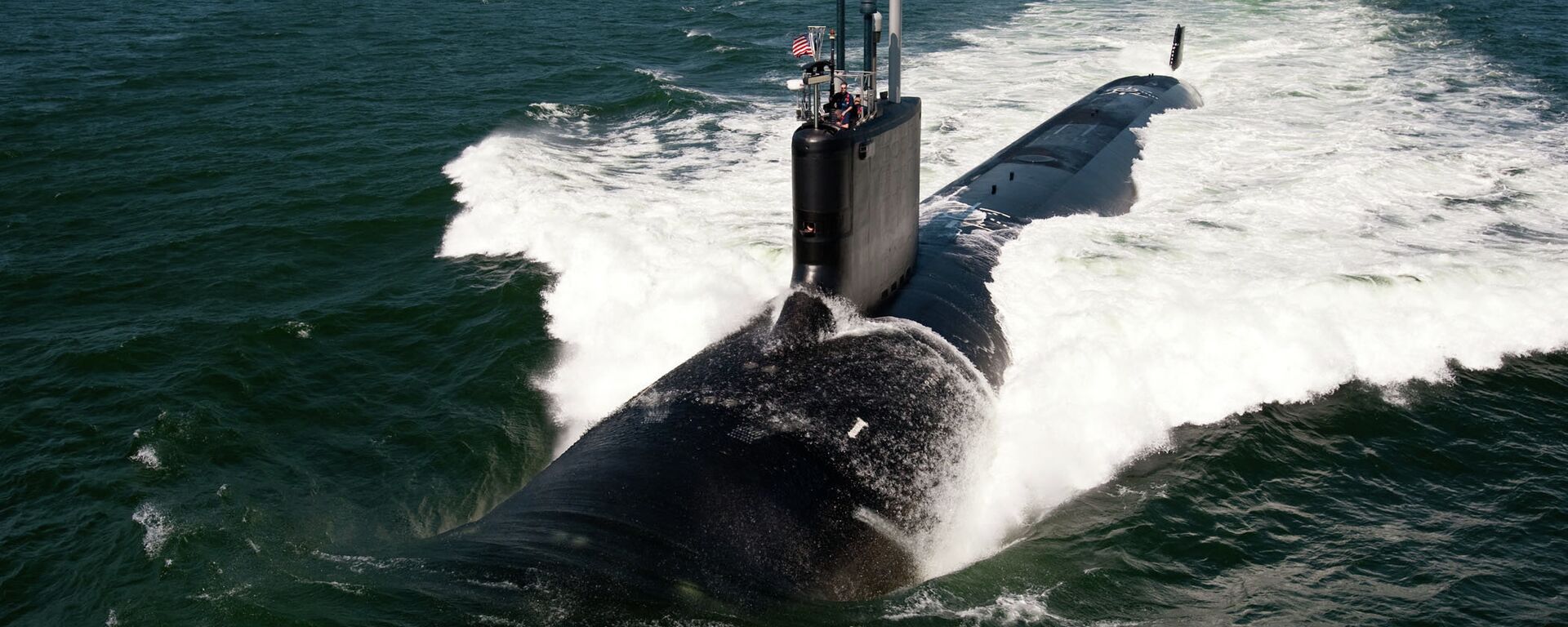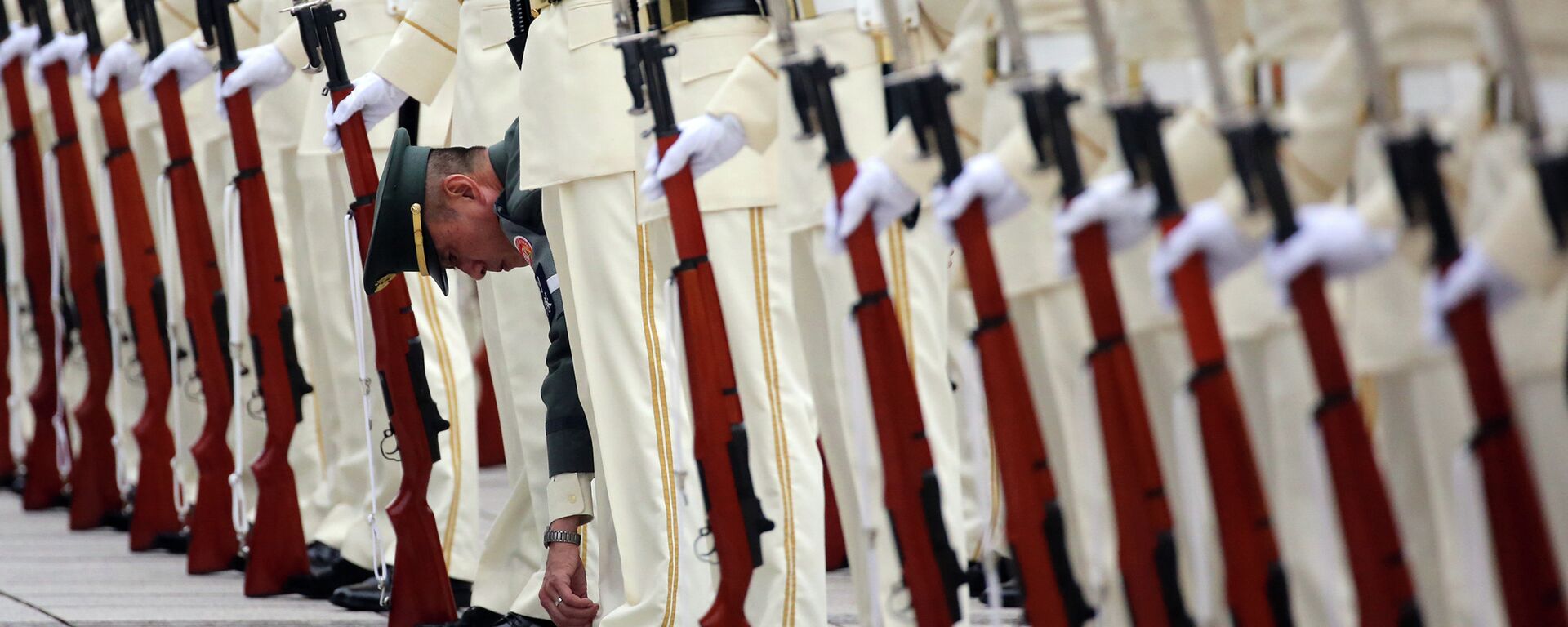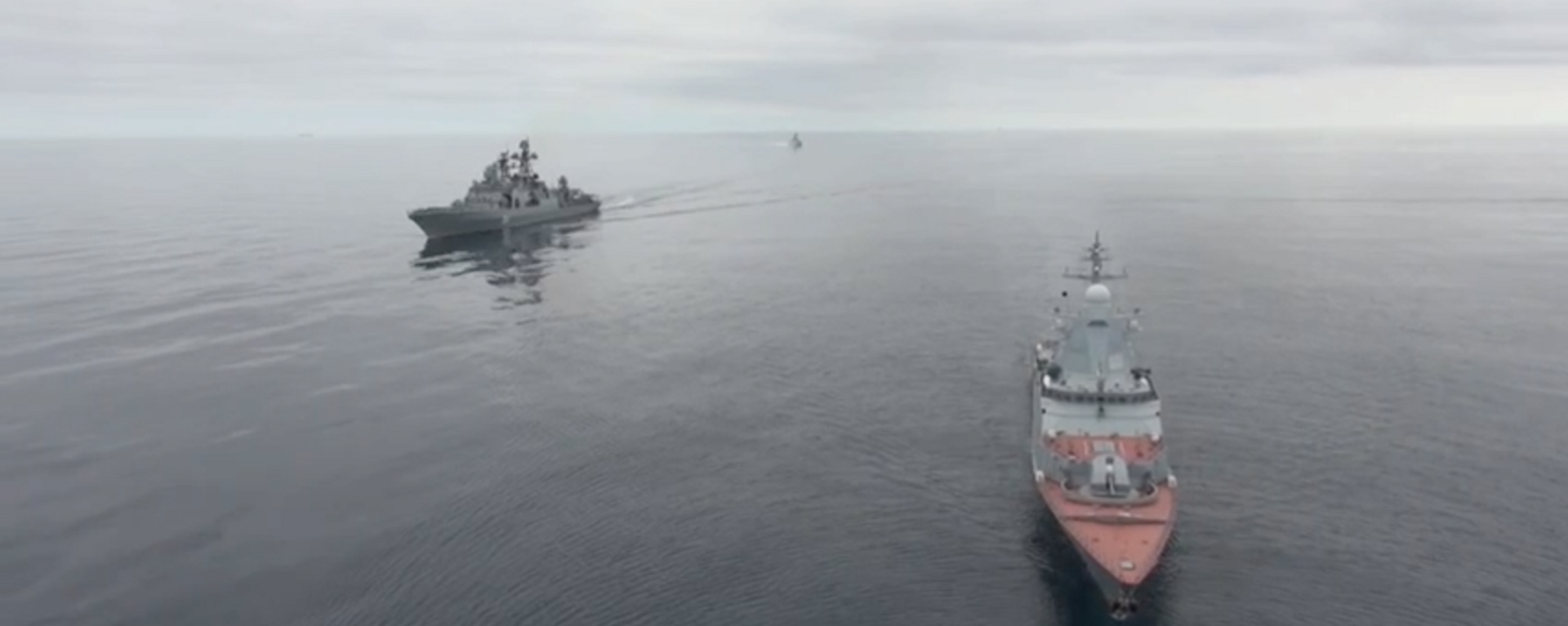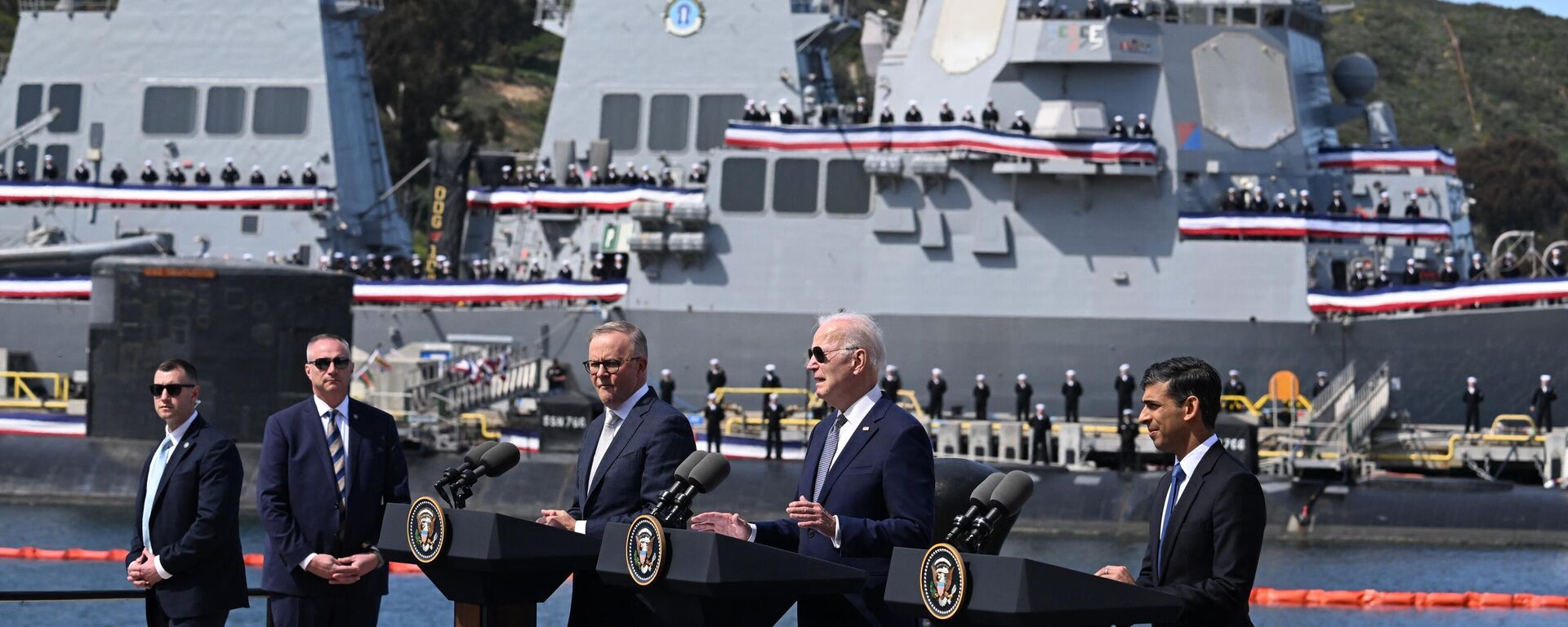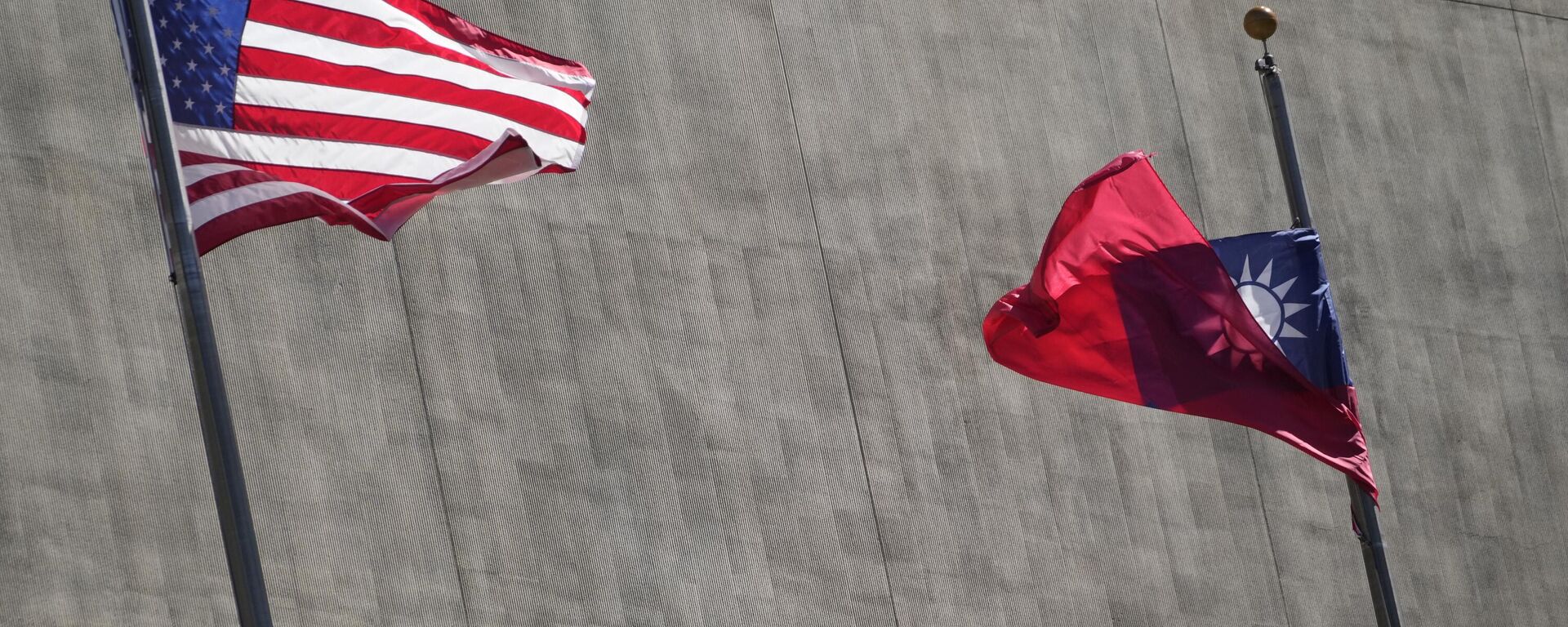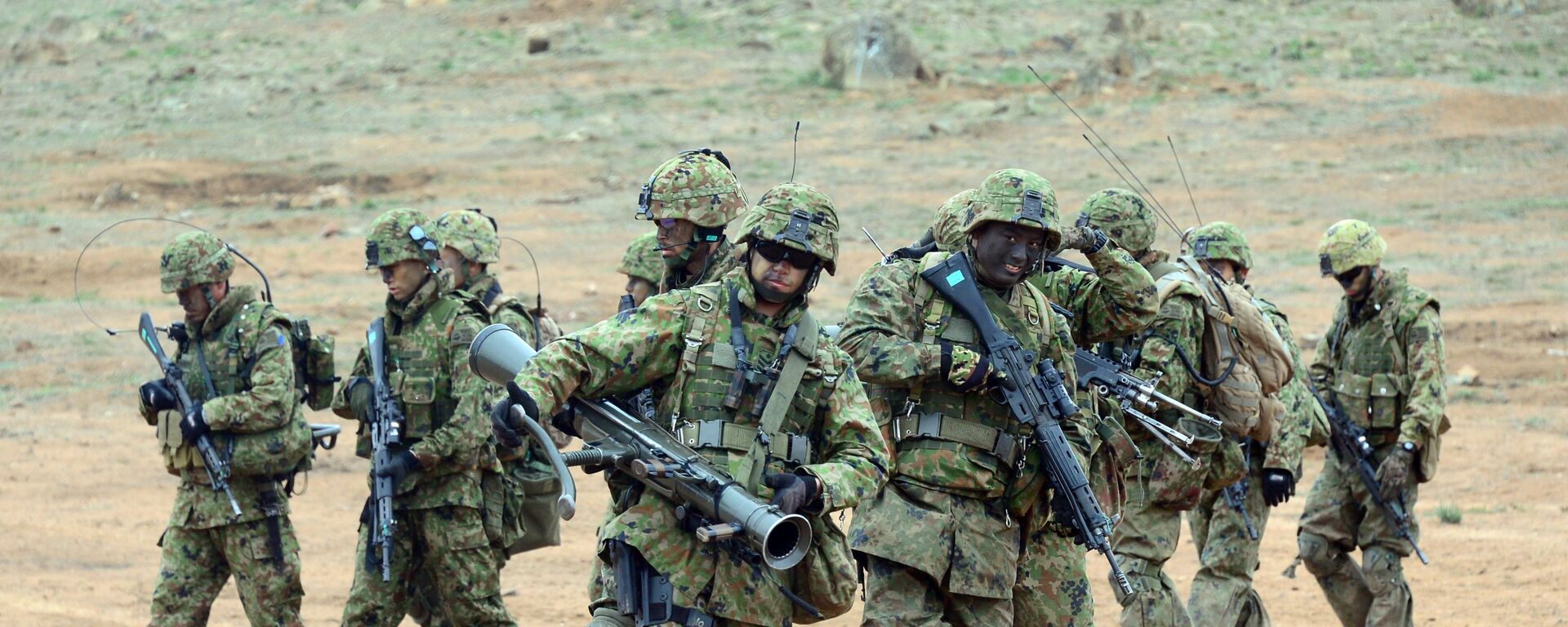https://sputnikglobe.com/20230815/why-merging-aukus-and-nato-would-pose-serious-danger-to-asia-pacific-1112617375.html
Why Merging AUKUS and NATO Would Pose Serious Danger to Asia Pacific
Why Merging AUKUS and NATO Would Pose Serious Danger to Asia Pacific
Sputnik International
Russian President Vladimir Putin does not rule out NATO's integration with AUKUS, a tripartite military alliance of the US, the UK and Australia. What would the potential "merger" mean for the Asia-Pacific region?
2023-08-15T14:59+0000
2023-08-15T14:59+0000
2023-09-18T13:37+0000
military
vladimir putin
joe biden
australia
pacific
aukus
nato
pentagon
japan
quadrilateral security dialogue (quad)
https://cdn1.img.sputnikglobe.com/img/07e6/08/0b/1099495217_0:0:2000:1125_1920x0_80_0_0_04a7eba3693142b900066507d93f305b.jpg
The US is seeking to reformat the system of interstate relations in the Asia Pacific region by forming new Washington-controlled military-political associations, noted Russian President Putin while addressing the 11th Moscow Conference on International Security on Tuesday.In recent years, the US administration has been beefing up its military presence in the region, forming new blocs and trying to make them interoperable, as per Professor Joe Siracusa, political scientist and dean of Global Futures, Curtin University."The secretary of defense, Lloyd Austin, runs around the Philippines, Japan, South Korea, Australia, talking about deepening strategic commitments, about doubling down in terms of policies, doctrines and American bases," Siracusa told Sputnik. "That is trying to put these countries assets for the use of the United States, that's really how it's done. It's done through the Department of Defense.""I think it also plays on the fears. Keep in mind, there are currently 193 nations in the world. And these are all nation states [...] and it's very hard to get people to do what you want them to do. Great powers have a way of pushing themselves around. I think it's done through soft diplomacy, too. You've gotta let people think that your goals are their goals and that your objectives are their objectives and that what you do is in their best interest. I mean, that's kind of how it's done, that kind of thing," the professor continued.US Weaving a Web of Military Alliances in Asia PacificThe AUKUS format was announced on September 15, 2021. Over the past two years the US, the UK and Australia have come up with a major nuclear-powered submarine deal and started to explore new military technologies, including drone swarms.New Zealand – Australia's closest neighbor – is reportedly considering joining the bloc. Most recently the Pacific nation refurbished its military doctrine, naming China – its major trade partner – as a rising challenge to "existing international rules and norms." Wellington has kicked off modernization of its armed forces calling for enhancing interoperability with its allies and partners.Even though Japan does not participate in the AUKUS format, it has struck a defense pact with Australia, one of the participants of the tripartite format. The treaty came into effect earlier this month. What's more, Japan is part of the Quadrilateral Security Dialogue, or the Quad, which was formed between Australia, India, Japan and the United States. Japan also launched a bold military modernization program late last year within the framework of the new security strategy. Tokyo's latest 2023 Defense White Paper, approved by Prime Minister Fumio Kishida and his government, warns about an advent of nothing short of "a new crisis era" and names Russia, China and North Korea as Japan's major challenges.Speaking to Sputnik earlier this week, Igor Istomin, lead research fellow at the Center for Advanced American Studies (MGIMO), highlighted that numerous pacts and blocs formed by Washington and its allies "are all intertwined with each other, and all pursue this goal of deterrence."Is AUKUS' Merger With NATO Possible?Siracusa agreed that AUKUS' "integration" with NATO is a plausible scenario."The integration they're talking about like, for example, war games," the expert said. "Australia just had war games off the north coast of Australia. Thirteen nations, including Germany from NATO and Japan were there and some of them were there for the first time. That's one way to integrate things - is to develop, to foster war games and pay for these things and to encourage prepositioning of men and materiel in other countries. I mean, this is one of the ways it's done. It's done in sort of an informal way and out of the view of the public eye, as a matter of fact. All of this happens at the military level. Some of it happens at the political level through soft diplomacy and the like. But I think it's a defense and diplomacy, soft diplomacy type approach to these countries."In fact, Washington is not concealing the fact that the allied blocs and pacts are meant to act in concert in the Asia Pacific region.On April 18, Admiral John C. Aquilino, United States Navy Commander at the US Indo-Pacific Command (USINDOPACOM), delivered testimony before the US House Armed Services Committee, outlining the Pentagon's vision of Washington's "Indo-Pacific strategy."Aquilino told US lawmakers that USINDOPACOM was closing ranks with AUKUS, the Quad diplomatic partnership, the Five Eyes Anglophone intelligence organization, and other blocs in order to "execute security cooperation activities, training, and exercises to strengthen those relationships, build partner capacity, and enhance interoperability." The commander also pointed out that the Pentagon was building "clusters" in the Asia Pacific together with the US allies, where "forward-based and rotational joint forces armed with lethal capabilities" would be located. He called for enhanced deterrence against China, Russia and North Korea and claimed that "a multipolar system" benefits "authoritarian regimes" in the first place.What Will US Allies Gain From Possible War in Asia Pacific?Washington's rationale behind the military buildup in the Asia Pacific is clear, per Siracusa: the American foreign policy establishment wants to return the United States to the position it had in 1991, when the US became the leader of a unipolar world after the USSR collapsed."That was a bit of an illusion, and it only lasted a very short time," the professor said. "But the neocons and the neoliberals who ran American foreign policy in 1991, I think they have been trying to recapture that for the past 30 years. That's what they've been doing around the world. Biden and the foreign policy establishment, those people who ran the show in the 1990s, this is why I think they still go after Russia, because this is unfinished business. They didn't cripple Russia enough after the end of the Soviet Union. They didn't cripple China enough after China decided to join the World Health Organization and the World Trade Organization and that kind of thing. I think it's the United States' way of trying, imagining it's getting back to a position that it thought it had then, but it really never did. I never believe for a minute that the United States was in control of the world."While Washington's desire of reviving its imperial posture is clear, it's not that clear how US allies in the Asia Pacific would benefit from the unfolding military buildup. Even though increased defense spending is promising new jobs and investments, a whole set of other sectors, including social policies, are likely to be sidelined. In addition, US-allied Pacific players risk disrupting ties and trade partnerships with China. Furthermore, if a potential conflict erupts in the region it could lead to destruction, economic losses and civilian casualties."If Australians wind up, for example, on an American nuclear submarine, that is, they're going to be trained on these things," Siracusa hypothesized. "And there are American nuclear powered and nuclear submarines in the South China Sea. And there is a confrontation between a Chinese ship and the American ship, and Australians are killed immediately. Then Australians will be dragged into a war they don't want, they can't afford, and so they'll be dragged in automatically. You've got to be very careful about how you spend your national treasure and blood. And Australia might be involved in circumstances over which it has no control and which does not serve Australia's national interests."International experts note that one of these potential conflicts could occur in the Taiwan Strait given that the Biden administration is increasingly militarizing the eponymous island. And it seems that US allies feel worried about the probability.In July, the Wall Street Journal broke that the Japanese government is ready to give permission to the US to use bases in Japan in the case of conflict over Taiwan, but Tokyo's own participation is unlikely. Japan is not the only US ally unwilling to fight with China over Taiwan, as per the Quincy Institute for Responsible Statecraft's July report. The Australian government in particular signaled that it gave no promises to Washington about military participation in a potential clash over Taiwan. The Philippines does not want to get dragged into the conflict, either. South Korea and Thailand also lack any appetite for joining the US potential combat operation in the Taiwan Strait, let alone act as US proxies, per the think tank.Meanwhile, the US is continuing to raise the stakes in the Asia Pacific, presenting its allies with a hard choice of whether to follow in Washington's footsteps at the expense of their own national interests or to embrace an independent foreign policy approach.
https://sputnikglobe.com/20230607/why-aukus-nuclear-sub-deal-will-stir-up-pacific-into-ocean-of-storms-1110982350.html
https://sputnikglobe.com/20230802/north-korea-accuses-japan-of-reverting-to-militarism-1112341232.html
https://sputnikglobe.com/20230813/does-new-japan-australia-defense-pact-bring-asia-pacific-closer-to-war-1112563049.html
https://sputnikglobe.com/20230815/us-plans-to-create-alliance-network-in-asia-pacific-region-to-deter-russia-china---russian-intel-1112615037.html
https://sputnikglobe.com/20230728/watch-russian-chinese-ships-embark-on-joint-patrols-in-pacific-ocean---1112213282.html
https://sputnikglobe.com/20230319/absolutely-not-australia-denies-quid-pro-quo-with-us-over-taiwan-in-return-for-nuclear-subs-1108559496.html
https://sputnikglobe.com/20230804/whats-behind-bidens-shift-to-arm-taiwan-1112390826.html
https://sputnikglobe.com/20230722/japan-doesnt-want-to-fight-for-taiwan-and-neither-do-other-us-allies-1112066099.html
australia
pacific
japan
russia
southeast asia
taiwan
north korea
Sputnik International
feedback@sputniknews.com
+74956456601
MIA „Rossiya Segodnya“
2023
News
en_EN
Sputnik International
feedback@sputniknews.com
+74956456601
MIA „Rossiya Segodnya“
Sputnik International
feedback@sputniknews.com
+74956456601
MIA „Rossiya Segodnya“
aukus, nato, asia pacific, biden's indo-pacific strategy, pivot to asia, deterrence against china, russia, north korea, us indopacom, us-australia submarine deal, nuclear race, asean, security risks in asia pacific, us military buildup in indo-pacific, quad, five eyes intel alliance
aukus, nato, asia pacific, biden's indo-pacific strategy, pivot to asia, deterrence against china, russia, north korea, us indopacom, us-australia submarine deal, nuclear race, asean, security risks in asia pacific, us military buildup in indo-pacific, quad, five eyes intel alliance
The US is seeking to reformat the system of interstate relations in the Asia Pacific region by forming new Washington-controlled military-political associations, noted Russian President Putin while addressing the 11th Moscow Conference on International Security on Tuesday.
"We do not rule out that they are seeking the full integration of NATO with the emerging structures of the AUKUS bloc," the Russian president underscored.
In recent years, the US administration has been beefing up its military presence in the region, forming new blocs and trying to make them interoperable, as per Professor Joe Siracusa, political scientist and dean of Global Futures, Curtin University.
"The secretary of defense, Lloyd Austin, runs around the Philippines, Japan, South Korea, Australia, talking about deepening strategic commitments, about doubling down in terms of policies, doctrines and American bases," Siracusa told Sputnik. "That is trying to put these countries assets for the use of the United States, that's really how it's done. It's done through the Department of Defense."
"I think it also plays on the fears. Keep in mind, there are currently 193 nations in the world. And these are all nation states [...] and it's very hard to get people to do what you want them to do. Great powers have a way of pushing themselves around. I think it's done through soft diplomacy, too. You've gotta let people think that your goals are their goals and that your objectives are their objectives and that what you do is in their best interest. I mean, that's kind of how it's done, that kind of thing," the professor continued.
US Weaving a Web of Military Alliances in Asia Pacific
The AUKUS format was announced on September 15, 2021. Over the past two years the US, the UK and Australia have come up with a major nuclear-powered submarine deal and started to explore new military technologies, including drone swarms.
New Zealand – Australia's closest neighbor – is reportedly considering
joining the bloc. Most recently the Pacific nation refurbished its military doctrine, naming China – its major trade partner – as a rising challenge to "existing international rules and norms." Wellington has kicked off modernization of its armed forces calling for enhancing interoperability with its allies and partners.
Even though Japan does not participate in the AUKUS format, it has struck a
defense pact with Australia, one of the participants of the tripartite format. The treaty came into effect earlier this month. What's more, Japan is part of the Quadrilateral Security Dialogue, or the Quad, which was formed between Australia, India, Japan and the United States.
Japan also launched a bold military modernization program late last year within the framework of the new security strategy. Tokyo's latest
2023 Defense White Paper, approved by Prime Minister Fumio Kishida and his government, warns about an advent of nothing short of
"a new crisis era" and names Russia, China and North Korea as Japan's major challenges.
Speaking to Sputnik earlier this week, Igor Istomin, lead research fellow at the Center for Advanced American Studies (MGIMO), highlighted that numerous pacts and blocs formed by Washington and its allies "are all intertwined with each other, and all pursue this goal of deterrence."
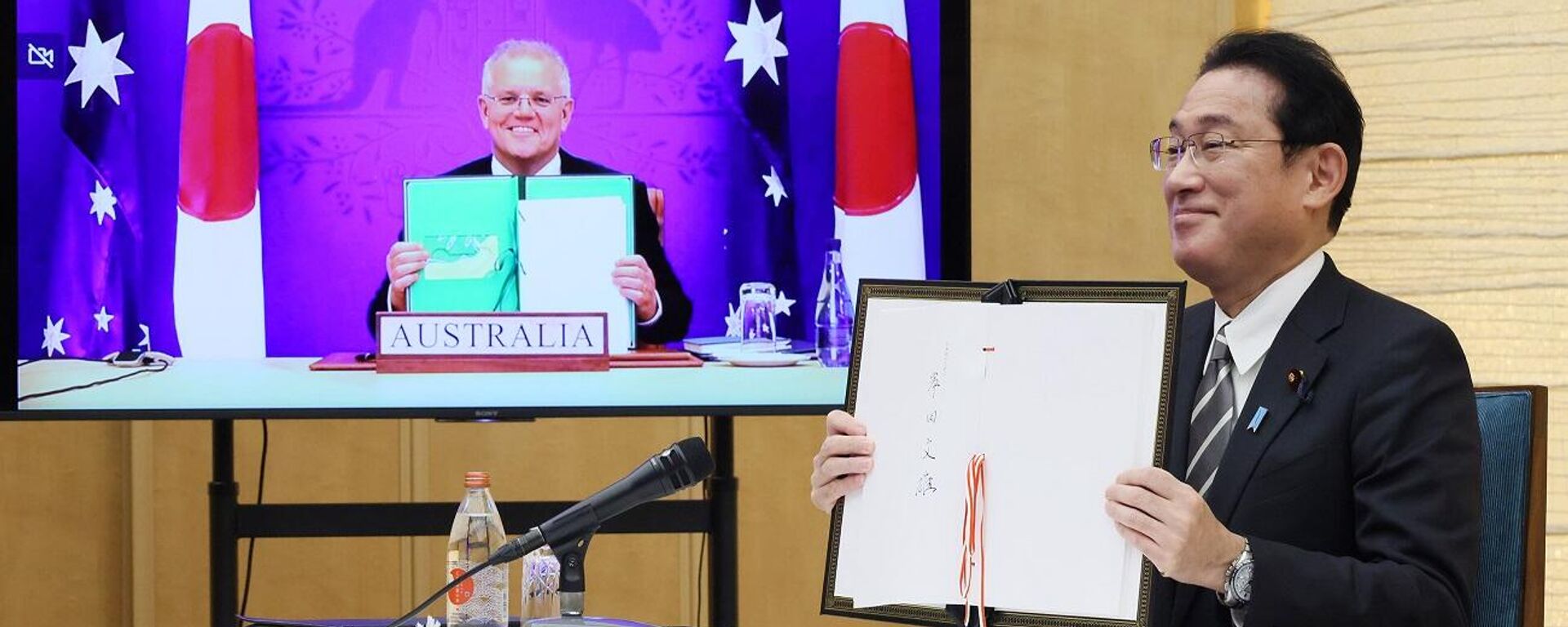
13 August 2023, 10:18 GMT
Is AUKUS' Merger With NATO Possible?
Siracusa agreed that AUKUS' "integration" with NATO is a plausible scenario.
"The integration they're talking about like, for example, war games," the expert said. "Australia just had war games off the north coast of Australia. Thirteen nations, including Germany from NATO and Japan were there and some of them were there for the first time. That's one way to integrate things - is to develop, to foster war games and pay for these things and to encourage prepositioning of men and materiel in other countries. I mean, this is one of the ways it's done. It's done in sort of an informal way and out of the view of the public eye, as a matter of fact. All of this happens at the military level. Some of it happens at the political level through soft diplomacy and the like. But I think it's a defense and diplomacy, soft diplomacy type approach to these countries."
In fact, Washington is not concealing the fact that the allied blocs and pacts are meant to act in concert in the Asia Pacific region.
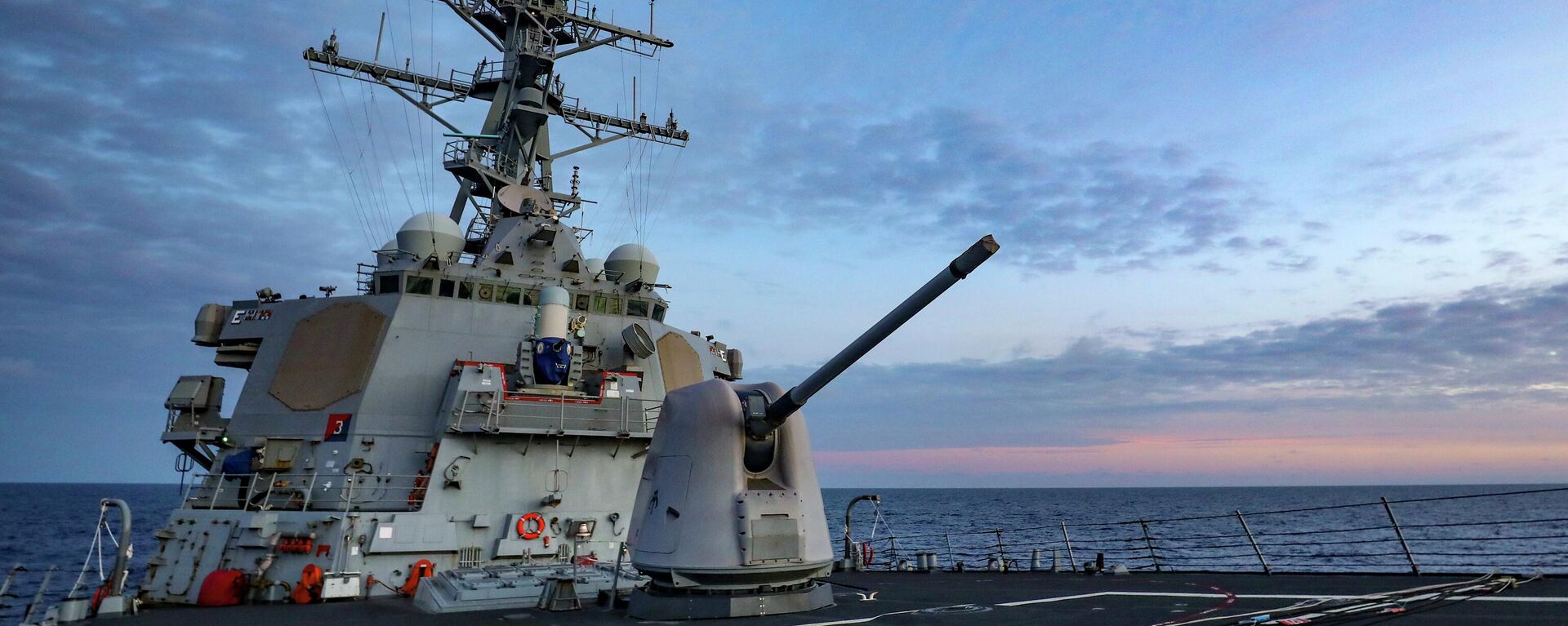
15 August 2023, 13:48 GMT
On April 18, Admiral John C. Aquilino, United States Navy Commander at the US Indo-Pacific Command (USINDOPACOM), delivered testimony before the US House Armed Services Committee, outlining the Pentagon's vision of Washington's "Indo-Pacific strategy."
Aquilino told US lawmakers that USINDOPACOM was
closing ranks with AUKUS, the Quad diplomatic partnership, the Five Eyes Anglophone intelligence organization, and other blocs in order to "execute security cooperation activities, training, and exercises to strengthen those relationships, build partner capacity, and enhance interoperability."
The commander also pointed out that the Pentagon was building "clusters" in the Asia Pacific together with the US allies, where "forward-based and rotational joint forces armed with lethal capabilities" would be located. He called for enhanced deterrence against China, Russia and North Korea and claimed that "a multipolar system" benefits "authoritarian regimes" in the first place.
What Will US Allies Gain From Possible War in Asia Pacific?
Washington's rationale behind the military buildup in the Asia Pacific is clear, per Siracusa: the American foreign policy establishment wants to return the United States to the position it had in 1991, when the US became the leader of a unipolar world after the USSR collapsed.
"That was a bit of an illusion, and it only lasted a very short time," the professor said. "But the neocons and the neoliberals who ran American foreign policy in 1991, I think they have been trying to recapture that for the past 30 years. That's what they've been doing around the world. Biden and the foreign policy establishment, those people who ran the show in the 1990s, this is why I think they still go after Russia, because this is unfinished business. They didn't cripple Russia enough after the end of the Soviet Union. They didn't cripple China enough after China decided to join the World Health Organization and the World Trade Organization and that kind of thing. I think it's the United States' way of trying, imagining it's getting back to a position that it thought it had then, but it really never did. I never believe for a minute that the United States was in control of the world."
While Washington's desire of reviving its imperial posture is clear, it's not that clear how US allies in the Asia Pacific would benefit from the unfolding military buildup. Even though increased defense spending is promising new jobs and investments, a whole set of other sectors, including social policies, are likely to be sidelined. In addition, US-allied Pacific players risk disrupting ties and trade partnerships with China. Furthermore, if a potential conflict erupts in the region it could lead to destruction, economic losses and civilian casualties.
"If Australians wind up, for example, on an American nuclear submarine, that is, they're going to be trained on these things," Siracusa hypothesized. "And there are American nuclear powered and nuclear submarines in the South China Sea. And there is a confrontation between a Chinese ship and the American ship, and Australians are killed immediately. Then Australians will be dragged into a war they don't want, they can't afford, and so they'll be dragged in automatically. You've got to be very careful about how you spend your national treasure and blood. And Australia might be involved in circumstances over which it has no control and which does not serve Australia's national interests."
International experts note that one of these potential conflicts could occur in the Taiwan Strait given that the Biden administration is increasingly
militarizing the eponymous island. And it seems that US allies feel worried about the probability.
In July, the Wall Street Journal broke that the Japanese government is ready to give permission to the US to use bases in Japan in the case of conflict over Taiwan, but Tokyo's own participation is unlikely.
Japan is not the only US ally
unwilling to fight with China over Taiwan, as per the Quincy Institute for Responsible Statecraft's July report. The Australian government in particular signaled that it gave no promises to Washington about military participation in a potential clash over Taiwan. The Philippines does not want to get dragged into the conflict, either. South Korea and Thailand also lack any appetite for joining the US potential combat operation in the Taiwan Strait, let alone act as US proxies, per the think tank.
Meanwhile, the US is continuing to raise the stakes in the Asia Pacific, presenting its allies with a hard choice of whether to follow in Washington's footsteps at the expense of their own national interests or to embrace an independent foreign policy approach.
